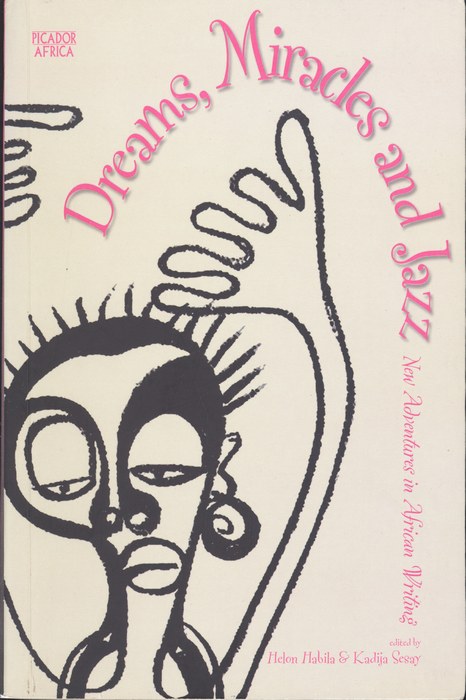Book Excerpt – Dreams, Miracles and Jazz
Dreams, Miracles and Jazz
by Helon Habila and Kadija Sesay
Poetry, Paperback
More Info ▶
INTRODUCTION
The turn of the millennium has seen an upsurge in new and young African writers and this has been particularly noticeable in terms of the number of women writers being published.
Helon Habila and I began this project around the time when this ‘upsurge’ started to happen, after we met at the Kennedy Center in Washington DC in 2002. At that time, he was the second winner of the Caine Prize for African Writing, and his immediate concern was to introduce other young African writers to the world stage. After greeting me he said, ‘I have this idea …’ We’ve been searching, selecting and editing ever since! The result is, Dreams, Miracles and Jazz: New Adventures in African Writing.
From the start, our conviction was that we should avoid pigeonholing the writers into a post-colonial bag or any other stereotype of what certain literary circles regard as ‘African literature’ and to present writers who had not previously published a full-length book. However, this work has taken quite some time to complete, so that along this journey, our selection of writers have been securing books deals and winning awards. From our point of view, this can only be seen as a confirmation of the strength of our choice.
In this anthology of twenty-five writers, (plus contributions from Helon Habila and myself), four other previous Caine Prize winners are here: Binyavanga Wainaina, Brian Chikwava, Segun Afolabi and the most recent winner, Monica Arac de Nyeko. Two others have been shortlisted for that prize – Jackee Batanda and Sefi Atta.
One of our criteria was that writers should be born on the African continent or be of African parentage. Sixteen of the writers included in this selection currently live in Africa, throughout the English-speaking countries of West, East and southern Africa. Of the remainder, there are writers living in the UK/Europe, USA, Australia and Asia. Similarly, the setting of these stories often reflects the place where the writers live (or have once lived), and so, not all of the stories are set in Africa, but in real and imagined places throughout the world.
Aside from this, our intentions were to select stories that covered a range of themes and emotions that conveyed ‘African sensibilities’ yet were universal in scope. We looked for humour, sadness, tragedy and joy – and we found it. Many of these stories, inevitably, are love stories: gentle as in ‘The Month of September,’ complex as in ‘It will Never be Yesterday’; love of country as in ‘The Promised Land’, love of tradition as in ‘The End of Skill’ and spiritual love as in ‘The Miracle Worker’ and ‘Faith’.
Also included in this selection are stories that stir us with experiences of civil war as in ‘Devils at the Door’, domestic violence in ‘Back Home’, family rejection in ‘Still Hope Survives’, family acceptance in ‘Random Check’ and the long journey to seek refuge in another country in ‘The Legendary Old Crosser’.
Memory provides unforgettable tales encompassing themes of genocide in ‘Land of my Bones’, African histories in ‘Remember, Olduvai’, and family in ‘An Affair to Dismember’. Politics, too, is a strong theme which is portrayed in various ways, from the favoured son in ‘Member of Parliament’, the returned son in ‘Native Son’, the oppressive visa queue of ‘A Pocketful of Dreams’, serious discussions in ‘When Night was Arrested’ and the extreme and the ridiculous in every sense in ‘The Browns’ Safari Honeymoon’. A tender story of old age is found in ‘The Wine Guitar’, trickery in ‘Spokesman’ and ‘Dancing to the Jazz Goblin and his Rhythm’, strength of community in ‘In the Clarity of a Third Class Compartment’, superstition in ‘Superstitions about Rats’ and HIV/AIDS in ‘On the Last Day’.
Yet, in some ways, this is misleading, as the stories are about all of these and more. Short in length, they encompass layers of meaning and subject matter that provoke strong emotions and discussion, whether on the topic of politics, family or love. But what they all do is to deal skilfully with everyday life or social issues of the day, whether they are set in Africa or the diaspora, using narrative styles that range from poetic prose to satire. They are told here in distinctive voices – voices that we believe show the newness and originality of African writers today.
We wanted to bring you new writers that we believe will become names to be recognised as (African) writers of note in the future – some of them are on the verge of doing so. Some of these writers are new to the craft while others have more experience as journalists and in writing for radio, for example.
More than anything else, we wanted writers who were willing to take risks and break boundaries in terms of style, content or language as, by doing so, in their own ways, they tell you what ‘African’ literature is.
Read Picador Africa’s description of Dreams, Miracles and Jazz.
Copyright © 2008 Macmillan Publishers/Helon Habila and Kadija Sesay No part of this excerpt may be reproduced or reprinted without permission from the publisher or author. The format of this excerpt has been modified for presentation here.

